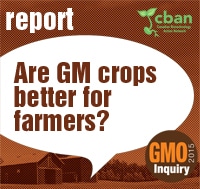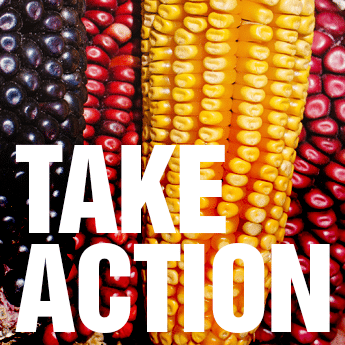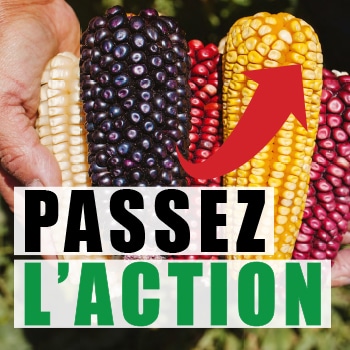Canola
Market Status
Almost all of the canola grown in Canada is genetically modified (GM or genetically engineered). It is all genetically engineered to be tolerant to herbicides. Canola oil is a common processed food ingredient and it is also used to feed many types of farm animals used for meat and milk production and for biofuel production.
Updates
In Memoriam: Percy Schmeiser. Saskatchewan farmer Percy Schmeiser died at 89, on October 14, 2020. “Corporations should not be able to control people, seeds, plants, and food through patent law.”
July 2020: Health Canada and the Canadian Food Inspection Agency approved a canola from the company Nuseed that is genetically engineered to have a modified fatty acid profile (and to be tolerant to the herbicide glufosinate ammonium). The canola has been genetically engineered to produce omega-3 fatty acids that are not otherwise present in canola seed. This is the first GM crop approved with a “healthier oil” profile but the seeds are not yet sold in Canada and it is not yet on the market for consumers.
Background
Canola is one of the five genetically engineered crops grown in Canada. Canola is Canada’s most second valuable crop, after wheat. Almost all the canola grown in Canada is genetically engineered – approximately 95%
Widespread contamination from GE canola has eliminated the growing of organic canola in most areas of Canada (some non-GE canola is grown on Prince Edward Island for export to Japan).
In the 1970’s public sector scientists and plant breeders in Canada developed canola when they bred out the “harmful” components of rapeseed through the slow process of traditional selection breeding. (Rapeseed is a member of the highly diversified brassica family, along with the mustards, brussels sprouts, cabbage and turnips. It was not considered edible because it contained high levels of glucosinolates and eurucic acid.) In 1995 the first genetically engineered canola was introduced on to the Canadian market – this was the first GE crop released in Canada. For information on the origins of canola: The Rape of Canola, Brewster Kneen, NC Press, 1992.
GM Canola Contamination
CBAN Report: GM Contamination in Canada: The failure to contain living modified organisms – Incidents and impacts, 2019.
The early adoption of GM canola by farmers in Canada was high, and so was contamination of non-GM canola. Contamination was found as early as 1998. Contamination from GM canola was so widespread in Canada that, by 2002, most, if not all, pedigreed seed growers in Saskatchewan would not warrant their canola seed stocks as GM-free. The case of GM canola shows that, even with the pedigreed seed sector’s strict varietal purity management control systems and the economic incentive to ensure that these controls work, the seed industry was unable to prevent contamination. By 2007, GM traits were documented in escaped and feral roadside populations of canola.
A 2003 survey of Canadian farmers growing genetically modified canola found that most farmers felt that it was not possible to control herbicide-tolerant traits from spreading in the environment and that methods like segregation, good farm practices – and even the idea of Terminator sterile-seed technology – could not control contamination. Farmers ranked loss of markets as the most important risk of growing GM canola.
Most organic grain farmers in Canada stopped growing canola altogether because contamination was so prevalent (organic farming prohibits the use of GM seeds). GM canola contamination meant that many farmers lost the use of an entire crop.
For information and analysis on the impact on Canadian farmers see CBAN’s 2015 GMO Inquiry report Are GM Crops Better for Farmers?
Organic Farmers in the Courts
In 2002, Saskatchewan’s certified organic farmers initiated a legal action taking Monsanto and Bayer Crop Science to court to get compensation for losses due to genetic contamination of their certified organic crops and fields by the companies’ genetically engineered canola. The organic farmers sought class action status to pursue their case and they also sought an injunction to prevent the introduction of GM wheat (Monsanto withdrew its plans to introduce Roundup Ready wheat in 2004).
The claim alleged that when Monsanto and Aventis (now Bayer) introduced their GM canola varieties, they knew, or ought to have known, that the genetically modified canola would spread and contaminate the environment, and that the companies had no regard for the damage these crops would cause to organic agriculture. The farmers held that the loss of canola as an organic crop robbed organic farmers of a high-paying and growing market. The class action was not certified in Saskatchewan and the Supreme Court would not hear the appeal, and so, in 2007, the legal action ended without actually being heard in the courts.
- May 2, 2007: The Saskatchewan Appeal Court denied the farmers class action status under Saskatchewan’s legislation.
- August 1, 2007: The farmers filed papers with the Supreme Court of Canada seeking leave to appeal the Saskatchewan Appeal Court decision.
- December 13, 2007: The Supreme Court of Canada turned down the appeal.
- In 2008, farmers Larry Hoffman and Dale Beaudoin announced their decision not to proceed with individual claims against Monsanto and Bayer.

Lawyer Terry Zakreski and plaintiffs Dale Beaudoin and Larry Hoffman in front of the courthouse in Saskatoon
The case involved legal questions of significant importance to the public, namely liability and rights associated with the development, marketing, sale and dispersal of GMOs, as well as public access to justice through class certification. The prevalence of open-pollinating GM crops on the landscape is a matter of significant environmental and public interest. These issues transcend provincial or territorial boundaries, as organic farmers in Saskatchewan can no longer grow and sell certified organic canola as a crop.
The question of liability of corporations for genetic contamination remains unresolved.
“I believe our case has raised awareness around the impacts of products released into the environment,” said Larry Hoffman. “We will work to further address those issues in the future.”
“We are closing a chapter, but not the book. We will challenge Monsanto and Bayer for the liberty, freedom and right to grow GMO free crops. We want to be able to save and use our own seed,” stated Dale Beaudoin. “The courts of the land failed to see our side of the story on how we needed canola in our rotation of crops. I was proud along with my co-partner, to represent organic farmers in this legal action. Just as in the Biblical story of David and Goliath, David has his moment of victory. Someday we, the organic farmers, will receive the justice we deserve.”
For more information see the website of SaskOrganic’s Organic Agriculture Protection Fund, a member of CBAN.
Non-GM Canola
There is non-GM canola grown in some areas of Canada, in geographically isolated places such as Prince Edward Island.
The introduction of GM seed is often followed by the removal of non-GM varieties, and a decline in the options available to farmers. In 2000, 80% of the 120 registered varieties of canola were non-GM but by 2007, only five varieties of non-GM canola were available.
As non-GM varieties are phased out, and because GM traits are bred into conventional crops that already have the best performance characteristics, buying GM seed is often the only way that farmers can access modern, high-yielding varieties. Additionally, as companies de-register old varieties in Canada, farmers using and saving those varieties lose the ability to use them.






